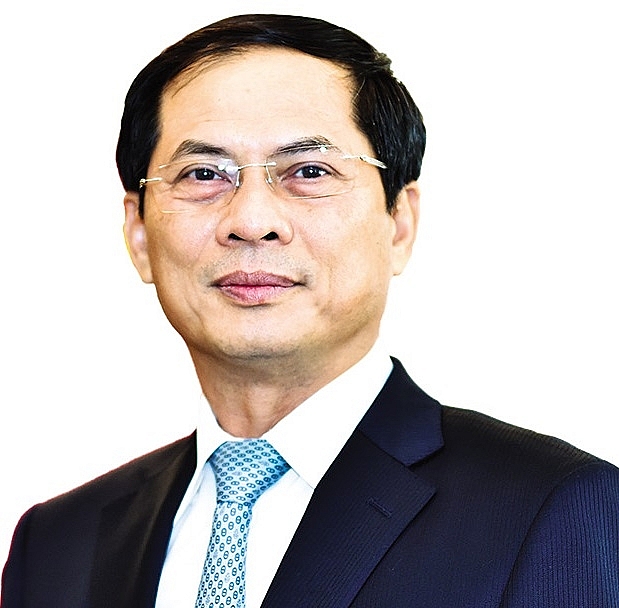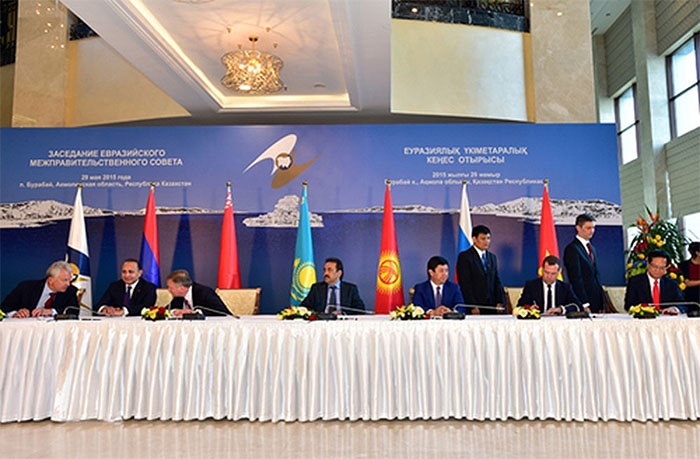Deeper down the FTA path
 |
| Bui Thanh Son |
The year 2018 has ended with rapid, multidimensional developments in the global economy and trade. The world economy continued its trend of recovery, but also featured signs of protectionism, growing nationalism, and the threat of a trade war expansion.
However, the trend of closer co-operation and economic connectivity is rising. This is in line with policies regarding competition among powerful countries, and the growing demand for economic development and diversified relations from developing and emerging countries.
Especially the Comprehensive and Progressive Agreement for Trans-Pacific Partnership (CPTPP), which took effect on December 30, attests to the strong determination of the 11 nations to pursue trade liberalisation based on law, rules, transparency, equality, inclusiveness, and mutual benefits.
Developments in global economy and trade have and will have a wide impact on Vietnam. The country will have numerous opportunities to expand and diversify its export markets, attracting resources into socio-economic development, and increasing co-operation with powerful countries and important partners.
However, there will also be challenges to face caused by trade frictions between powers, and fluctuations from the external environment, particularly across sectors such as trade, finance, and monetary, along with other factors such as climate change and geo-political tensions.
The hallmarks of integration
Weathering challenges and grabbing opportunities with both hands, Vietnam has been able to reap outstanding achievements in international economic integration and connectivity.
The country has succeeded in organising many multilateral diplomatic events, especially the World Economic Forum (WEF) on ASEAN 2018, themed “ASEAN 4.0: Entrepreneurship and the Fourth Industrial Revolution.” The event saw the participation of over 1,000 delegates, including nine heads of states, prime ministers, and over 800 leaders from global and regional businesses.
Being the most successful WEF event over the past 27 years, WEF ASEAN 2018 advanced policy recommendations for issues relating to the development and integration of ASEAN member states and the region as a whole amidst Industry 4.0. Through this event, Vietnam was able to further promote its image and development potential throughout the region and the wider world, allowing links to be forged between domestic businesses and overseas partners.
Additionally, Vietnam has boosted off the negotiation and signing of several free trade agreements (FTAs). On March 8, 2018, the country inked the CPTPP along with its partners, a new-generation FTA with a wide range of commitments and the highest-ever standards for the nation.
The deal features 11 member states, with a total GDP of $10 trillion, accounting for 13 per cent of the global GDP. It was ratified by the Vietnamese National Assembly on November 12, 2018 and will help the country to boost its economic reforms, perfect its market economic mechanism, and enable Vietnam to expand its external economic relations.
Another important event is the adoption of the EU-Vietnam trade and investment agreements by the European Commission on October 17, 2018. The commission is now submitting the proposals to the European Council for the signature and conclusion of both agreements. According to EuroCham in Vietnam, the EU-Vietnam Free Trade Agreement, upon coming into force, will help increase the country’s GDP by an additional 10-15 per cent, and raise the country’s export turnover by an additional 30-40 per cent over the next more than 10 years.
Vietnam has also been implementing its international commitments. Between now and 2030, the country will almost complete all commitments within the FTAs and other economic frameworks it has joined.
The 2017-2018 period was the first major milestone in the process, with a focus on completing commitments within the ASEAN Trade in Goods Agreement and within the World Trade Organization (WTO), as well as in making preparations for implementing its CPTPP commitments.
Undertaking international commitments has helped the country attract more foreign investment and foreign currency. This was especially true in 2018 as the nation’s export turnover hit $244.72 billion, up 13.8 per cent against the 2017 figure, with a trade surplus of $7.2 billion.
The country also enacted and implemented its policies of further international integration, with the participation of the whole political system. On August 8, 2018, the Party Central Secretariat promulgated Directive No.25-CT/TW on enhancing the role of multilateral diplomacy through to 2030, marking a change in mindset and direction on multilateral diplomacy, with a focus on economic integration.
On September 4, 2018, the prime minister enacted Directive No.26/CT-TTg on strengthening international economic integration. Ministries, agencies, and localities have also been actively engaged in negotiations and taking advantage of opportunities from Vietnam’s international economic commitments.
However, despite these prominent achievements, some limitations were still seen in 2018. A number of localities remain slow in implementing international economic integration activities, while the capacity for integration, including the capacity to solve disputes in international trade and investment, remains limited. Awareness among enterprises about foreign markets and laws, as well as Vietnam’s FTA commitments, also remains limited.
 |
| Deeper down the FTA path, source: internet |
To-do list
In the 2019-2020 period, Vietnam will begin to officially implement commitments in new-generation FTAs, including the CPTPP which will officially take effect on January 14, 2019 for the country.
In this period, commitments will have to be completed within many important economic co-operation frameworks, such as the ASEAN-China FTA, the ASEAN-Hong Kong FTA, and completing the Bogor Goals within the Asia-Pacific Economic Cooperation (APEC) forum. The nation will also have to adopt the post-2020 APEC Vision, and act as chair of the ASEAN in 2020.
This will require strong determination and efforts from across the government, ministries, agencies, and the wider society. To this end, a series of things will have to be done.
Specifically, focus must be given to promote the country’s role as a responsible member of the international community via its taking the initiative in contributing to, and actively partaking in, constructing, and shaping multilateral institutions and important economic forums in line with the country’s capacity and conditions. In this, great importance must be attached to enhancing the effectiveness in joining economic forums in the Asia-Pacific region.
It is necessary to perfect policies and legal frameworks with a long-term vision in order to effectively undertake all of the nation’s international commitments. There is a big need to amend, supplement, and promulgate new legal documents and regulations regarding Vietnam’s international commitments in new-generation FTAs, such as the CPTPP, including commitments in the sectors of intellectual property, environment, and labour. Furthermore, it is needed to further enhance the country’s capacity in economic integration and connectivity. A focus must be placed on executing solutions in the prime minister’s Directive No.38/CT-TTg dated October 19, 2017 on strengthening the application and effective exploitation of FTAs, and Directive No.26/CT-TTg on strengthening international economic integration.
Imminently, ministries, agencies, localities, and enterprises need to have solutions and plans in place to maximise the benefits from FTAs. This must be done in order to expand export markets, improve products’ value, and raise the country to a new position in the region and the world, in terms of supply chains and manufacturing.
In addition, it is necessary to promote information about the opportunities and challenges, as well as wider commitments in new-generation FTAs which will have an impact on localities and businesses, regarding market access, intellectual property, and labour. Ministries and agencies need to provide early information that is necessary for localities and enterprises regarding the policies of nations which could negatively impact Vietnam’s external economic sector.
Moreover, it has become all the more important to improve the nation’s capacity to solve international trade disputes and trade protection. Relevant agencies need to closely follow the process of restructuring the WTO, especially issues regarding the operation of the organisation’s dispute settlement mechanisms so that Vietnam can have a voice to ensure its benefits in the WTO.
The outstanding hallmarks of the country’s international economic integration and connectivity have added an array of colours to the country’s multilateral diplomatic picture in 2018.
Through strong determination and a great effort from the whole political system, we do believe that the process of international economic integration and connectivity will bring greater achievements. This will contribute to well accomplishing goals regarding development and closer international integration in the future.
What the stars mean:
★ Poor ★ ★ Promising ★★★ Good ★★★★ Very good ★★★★★ Exceptional
 Tag:
Tag:
Related Contents
Latest News
More News
- Hermes joins Long Thanh cargo terminal development (February 04, 2026 | 15:59)
- SCG enhances production and distribution in Vietnam (February 04, 2026 | 08:00)
- UNIVACCO strengthens Asia expansion with Vietnam facility (February 03, 2026 | 08:00)
- Cai Mep Ha Port project wins approval with $1.95bn investment (February 02, 2026 | 16:17)
- Repositioning Vietnam in Asia’s manufacturing race (February 02, 2026 | 16:00)
- Manufacturing growth remains solid in early 2026 (February 02, 2026 | 15:28)
- Navigating venture capital trends across the continent (February 02, 2026 | 14:00)
- Motivations to achieve high growth (February 02, 2026 | 11:00)
- Capacity and regulations among British areas of expertise in IFCs (February 02, 2026 | 09:09)
- Transition underway in German investment across Vietnam (February 02, 2026 | 08:00)






















 Mobile Version
Mobile Version